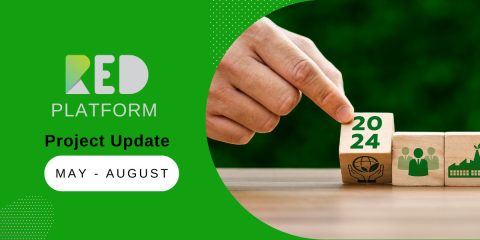 Information is the lifeblood of business. The quicker and more effective it is received, the better. Blockchain is excellent for providing information because it delivers immediate, shareable, and entirely transparent information kept on an immutable ledger that permissioned network users can only view. Orders, accounts, payments, production, and much more may get tracked using a blockchain network. You can see all facts of a transaction end to end since members share a single view of the truth, providing you greater confidence and additional efficiencies and opportunities.
Information is the lifeblood of business. The quicker and more effective it is received, the better. Blockchain is excellent for providing information because it delivers immediate, shareable, and entirely transparent information kept on an immutable ledger that permissioned network users can only view. Orders, accounts, payments, production, and much more may get tracked using a blockchain network. You can see all facts of a transaction end to end since members share a single view of the truth, providing you greater confidence and additional efficiencies and opportunities.
What is blockchain?
A blockchain is a decentralized database that is distributed among computer network nodes. A blockchain functions as a database of information stored in a digital format. Blockchains are known for their critical role in keeping a secure and decentralized record of transactions in cryptocurrency systems like Bitcoin. The blockchain’s novelty ensures the fidelity and security of a data record while also generating trust with no requirement for trusted third parties.
Safeguarding environmental integrity through blockchain
Blockchain is a vital instrument that can dramatically increase greenhouse gas emissions transparency, accountability, and traceability. It enables businesses to give more accurate, trustworthy, consistent, and easily accessible carbon trading data.
Contracts on the blockchain can get used to compute better, track, and report on carbon footprint reduction across the entire value chain. It can enable immediate authentication, real-time data verification, and clean data records.
Blockchain technology has the potential to turn a company’s individual efforts into a networked endeavor. It may also clearly identify individual actors’ contributions to reducing their carbon footprint and even to carbon trading. The spirit of competition, combined with market-based incentives, results in a win scenario for all parties involved.
Startups in clean technology play a crucial part in this process. They create blockchain-based platforms that bring all parties together, including businesses, governments, and individuals.
Blockchain’s decentralized method gives both depth and breadth. It involves everyone in the calculation and allows them to contribute. It enables manufacturers, distributors, suppliers, and consumers to track and report emission reductions across the whole supply chain.
Blockchain innovations are powerful accelerators for collaborative action in the battle against climate change. The significance of recognizing the distinguished contribution of clean technology entrepreneurs in this process cannot get overstated. Investors, both public and private, recognize their particular value.
Applications of blockchain
While the concept works well for cryptocurrencies such as Bitcoin, blockchain technology has a wide range of other uses. Here are a few examples.
-
Transferring funds
Cash transactions over the blockchain can be less costly and quicker than conventional methods. This is especially true with cross-border transactions, frequently delayed and expensive.
-
Financial operations
Past few years, many businesses have sprung up to provide decentralized bitcoin exchanges. When it comes to sales, blockchain enables speedier and less costly deals. Additionally, because the decentralized exchange does not obligate investors to transfer their assets with centralized authority, they have more control and security.
-
Lending
Lenders can use intelligent contracts to carry out collateralized loans to the blockchain. Specific events, including a service payment, a margin requirement, the total amount of the loan, and asset release, can be automatically triggered by smart contracts created on the blockchain.
-
Insurance
Protecting data such as a social security number, date of birth, and other identification information on the public from the register (e.g., a blockchain) might be safer than existing systems more prone to hacks. Blockchain technology could protect access to identifiable information while enhancing access for those in need in sectors such as healthcare, finance, travel, and education.
-
Safe personal information
Keeping data like your date of birth, Social Security number, and other identifying information on a public ledger (such as a blockchain) may be more secure than current hack-prone solutions. In industries like travel, healthcare, finance, and education, blockchain technology could control access to identifying details while also improving access for those who need it.
-
Real estate
-
Voting
-
Securely share medical information
-
Government benefits
-
Non-fungible tokens
-
Logistics and supply chain tracking
-
Data storage
-
Gambling
A platform that supports blockchain and carbon trading: Restart Energy Democracy
The Restart Energy Democracy Platform (RED Platform) is a blockchain-based web platform that offers consumers a memorable experience in carbon trading, environmental certificates, and renewables from producers to end-users.
The RED Platform allows sustainable energy providers to validate the provenance of green energy generated on the blockchain, including REO-G tokens established following European-origin assurances. Such renewable energy source credentials could also be offered to businesses. Afterward, the firms may utilize them to show their blockchain resilience. Under the Restart Energy trademark, the RED network is built on Zalmoxis, a cutting-edge blockchain technology. Energy consumption is 1.000 times smaller; emissions are zero, gas taxes are nearly equal to zero, and speeds are close to 100 times faster.
Final thoughts
Companies are continually exploring new ways to utilize blockchain technology to support their operations, although it has only existed for a dozen years. With the increasing usage of digital data in our lives, the data protection, openness, access, and data integrity that blockchain can supply is becoming more critical.
We can act in present for a better future, so this is the reason we think you should join the RED Platform. Embrace change and use blockchain technology as soon as possible!


